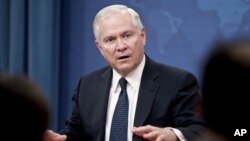U.S. Defense Secretary Robert Gates said Thursday he is guardedly optimistic about the U.S.-led military campaign against the Taliban in Afghanistan. Gates and Secretary of State Hillary Clinton appeared at a Senate hearing in support of the Obama administration's request for additional funding for operations in Afghanistan and Iraq.
Gates says that while most of the 30,000 additional troops President Obama has ordered sent to Afghanistan have not yet arrived, there are reasons to hope that the tide may be turning against Taliban forces.
Gates and Secretary of State Clinton appeared before a Senate Appropriations subcommittee in support of more than $35 billion in supplemental funding for this fiscal year, mainly to support a surge in both U.S. military and civilian personnel in Afghanistan.
The defense chief, who visited combat zones in southern Afghanistan two weeks ago, said there are grounds for guarded optimism as the campaign to roll back the Taliban gains momentum, and Afghan forces take on increased responsibilities.
He said the surge in U.S. and NATO forces is aimed at least in part at convincing the Afghan public that the widely unpopular but intimidating Taliban is no longer ascendant.
"The Taliban may be vicious, but they're also incredibly unpopular in Afghanistan," said Robert Gates. "Every reliable poll that I've seen over the past couple of years shows the Taliban support in Afghanistan at around ten per cent or less. So these people aren't fond of the Taliban, they're just intimidated by them."
Gates said despite his measured optimism, there are, as he put it, many tough days ahead and that it may take several months for the buildup to show tangible results.
He refused, under questioning from several panel members, to speculate how long the U.S. military role in Afghanistan will last. But he said the administration intends to hold fast to its plan to begin transferring security responsibilities to Afghan forces next year.
"They need to know that this is their fight and that they're going to have to assume responsibility for it, and not at some distant unknown date, but beginning next year," he said. "And between that and the pay raises that we saw last November, we have seen a significant increase in recruitment in Afghanistan for both the Afghan army and the police."
Secretary Clinton said the U.S. civilian presence in Afghanistan, though far smaller than the military one, has quadrupled in the past year.
She said that buildup, for which she is seeking $2 billion in additional funding, is essential to help Afghan authorities secure areas wrested from Taliban control such as the southern Afghan town of Marjah.
In wide-ranging testimony, Clinton suggested that the status of radical Muslim al-Shabab militiamen in Somalia was analogous to that of the Taliban - with Somalis resisting its efforts to rule by terror.
"There is a growing sense that many of the Somalis themselves are no longer willing to be intimated by, or just give, in to al-Shabab," said Hillary Clinton. "They've been extremely brutal in their treatment of people - a lot of amputations and other kinds of very barbaric punishments. They have stolen and diverted food aid, and prevented it from getting to the people. So there is a gradual growth of opposition internally in Somalia."
Clinton said U.S. logistical help for the Ugandan-led African Union force in Somalia, and training for troops of the embattled Transitional Federal Government, are critical to the survival of the embattled TFG whose authority is limited to only parts of the capital, Mogadishu.
Gates: Guarded Optimism About Afghan War




